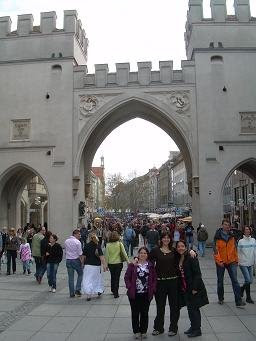Especialmente el fin de semana, se puede viajar entre distintos Bundesland bastante más barato que lo usual, ya que pueden viajar hasta 5 con un billete. Lo malo, claro, es que solo podes viajar en trenes regionales. De modo que hasta Münich son al menos 3 o 4 horas. Pero como Venecia nos dejó medio en la lona, decidimos igual ir y volver en el día. Fuimos con Elena, Michael y Daniela, y además se nos unieron en el paseo amigos de Elena que viven allá.
Más que nada estuvimos de paseo por las calles. La plaza principal, Marienplatz, está muy bien. El ayuntamiento es alucinante.
Tomamos bastante cerveza también, en especial en la Hofbräuhaus, famoso local que era antiguamente la cervecería real del reino de Baviera. La cerveza estandar es una "Maß", de 1 litro, que son las tipicas también del Oktoberfest. Más chica no hay.
Me quedó por ver el museo de técnica, pero ya me avisaron que es casi como para todo el día, asi que quedará para la próxima vez con más tiempo.



















